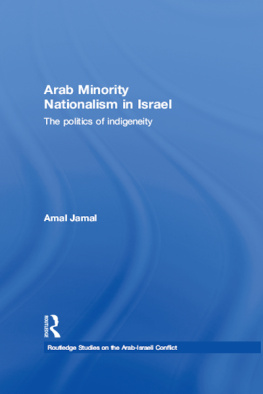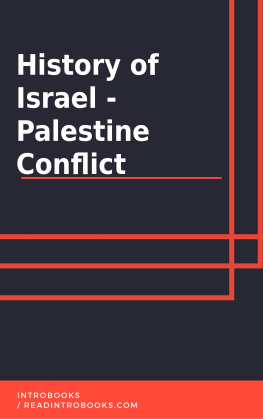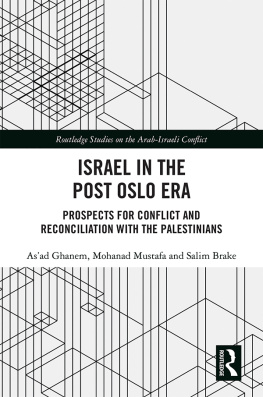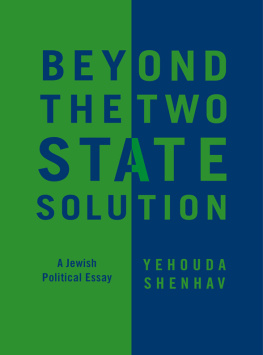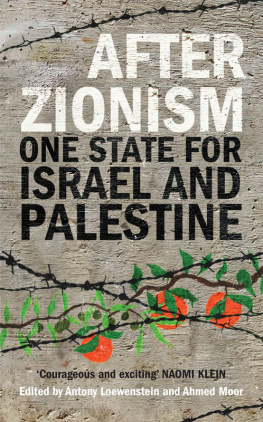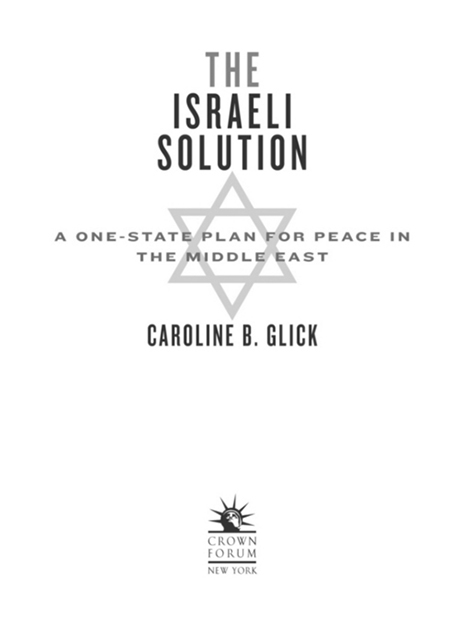Copyright 2014 by Caroline Glick
All rights reserved.
Published in the United States by Crown Forum, an imprint of the Crown Publishing Group, a division of Random House LLC, a Penguin Random House Company, New York.
www.crownpublishing.com
CROWN FORUM with colophon is a registered trademark of Random House LLC.
Library of Congress Cataloging-in-Publication Data Glick, Caroline B.
The Israeli solution : a one-state plan for peace in the Middle East / by Caroline Glick.First Edition.
pages cm
1. Arab-Israeli conflictPeace. 2. Arab-Israeli conflictTerritorial questions.
3. Arab-Israeli conflictOccupied territories. 4. West BankInternational status. 5. IsraelBoundaries. I. Title.
DS119.7.G584 2014
956.053dc23
2013032207
ISBN 978-0-385-34806-5
eBook ISBN 978-0-385-34807-2
Jacket design by Jessie Sayward Bright
Jacket photograph by Getty Images
v3.1
To my parents
Gerald (of blessed memory) and Sharon Glick (may she live to 120).
Thank you for my good life.
CONTENTS
PREFACE
Over the past generation, politics in America has become a zero-sum game, with conservatives and liberals moving farther and farther apart. On matters from the economy to social issues to national security and foreign policy, it has become harder, and sometimes impossible, to find common ground between their views.
In this polarized environment, one American policy stands out for its unique ability to attract supporters from both sides of the ideological divide. That policy relates to how the United States should deal with the Arab-Israeli conflict.
From left to right, among both Democrats and Republicans, the reigning consensus is that the United States must seek to resolve the Arab worlds conflict with Israel generallyand the Palestinians conflict with Israel in particularby implementing the so-called two-state solution.
Establishing a Palestinian state, so the thinking goes, would be a panacea for all the regions ills. It would end the Arab worlds conflict with Israel, because the reason the Arab world is anti-Israel is that there is no Palestinian state. It would also nearly erase the Arab worlds anti-Americanism, because the reason the Arabsand the larger Muslim worldare anti-American is that the United States supports Israel even though there is no Palestinian state. Based on this thought chain, most American policy makers across the ideological spectrum share the view that the establishment of a Palestinian state west of the Jordan River would remove the principal cause of the violent extremism that afflicts the Arab and the larger Islamic world.
Ironically, the two-state solution is among the most irrational, unsuccessful policies the United States has ever adopted. For the past ninety years, the two-state solution has been tried more than a dozen times, and every time it has failed, abysmally. Between 1970 and 2013, the United States presented nine different peace plans for Israel and the Palestinians, all based on the two-state solutionand for the past twenty years, the two-state solution has been the centerpiece of U.S. Middle East policy. But despite this laser focus, American efforts to implement the two-state solution have all been dismal failures. Moreover, these abortive efforts have weakened the U.S. position in the Middle East: with each new attempt at achieving a two-state peace deal, the Middle East has become less stable, more violent, more radicalized, and more inimical to American values and interests.
There are two main reasons for this weakening effect. First, the repeated failures make the United States look impotent. Washingtons failure to impose its will on far less powerful nations in the region makes it appear weak to the Muslim world and so decreases respect for American power among Muslim societies.
Second and more important, the mistaken assumptions that fuel U.S. policy makers support for the two-state solution are the same ones that cloud their thinking and decision making about the Middle East at large. The two-state solution treats the Arabs and the broader Muslim world as objects to be acted upon rather than as actors whose actions, beliefs, and choices determine their fates. The policy assumes that only Israel and the United States are actors on the ground and that both are at fault for the conflict: Israel because it refuses to surrender to all the Palestinians demands, and the United States because it has failed to force Israel to surrender to all the Palestinians demands.
This overlooking of the rest of the Arab world, which stands at the heart of the two-state solution, is the core reason that U.S. policies in the region have been self-defeating ever since it began promoting that policy paradigm.
In Iraq and Afghanistan, for example, the Bush and Obama administrations failed to acknowledge or act on information that proved Iran was playing a leading role in fueling the insurgencies. Iran and Syria aided both Shiite and Sunni insurgents in Iraq by supplying weapons and manpower.Irans aggression was caused by its fundamental assumption that Iranlike the rest of the Muslim worldwas not motivated chiefly by internal impulses, such as ideology, nor by its perception of its own national interests, but from extraneous forcesspecifically, Israeli and American actions. The United States doesnt need to act on Iranian direct aggression, or even against Irans illicit nuclear weapons program, because once it succeeds in persuading Israel to give away the requisite lands to the Palestinians, and once it provides Iran with other concessions, much of the threat emanating from Iran will be neutralized.
Relatedly, both the Bush and Obama administrations engaged in negotiations with the Taliban, believing that the Talibans jihadist worldview was not inherently hostile to American interests and values but was based on limited interests that could be appeased through negotiations. The Taliban openly hate America and all nonradical Islamic societies, and they reject democratic values like freedom for women and freedom of religion. Nonetheless U.S. leaders chose to believe that the Talibans hatred of America was motivated more by U.S. actions than by their own inherently anti-American ideology. Washington has taken the same approach in its dealings with Syria, Hezbollah, Saudi Arabia, and the Muslim Brotherhood.
In all cases, Americas embrace of the two-state solution as the centerpiece of its regional policy is the key reason that American policy makers insist that the actions, stated intentions, and ideologies of all regional actors aside from those of Israel are irrelevant. Regional peace can be established only after Israel surrenders to all the Palestinians demands. Nothing anyone elseincluding the Taliban and Irandoes matters. All else can be set aside. All else can be explained away. All else can be appeased. Only America and Israel are responsible for creating and solving the problems of the region.
Despite the debilitating impact that the two-state solution has had on American strategic thinking and actions, any time a prominent policy maker or politician points out the policys obvious futility, he is immediately castigated as a flame-throwing extremist.
Take the case of former Speaker of the House of Representatives
Although conservative and liberal pundits piled criticism on him, all Gingrich had done was share readily available information.




